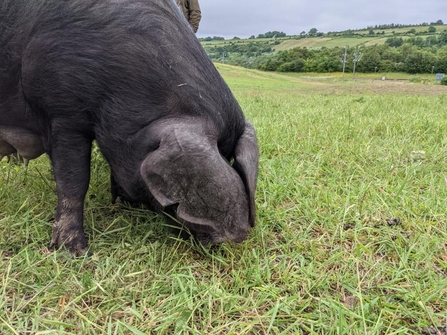
We currently have 137 active volunteers carrying out daily livestock checks on up to 29 sites, depending on the time of year. 15 volunteers have been attending training sessions over the last 3 months, and everyone seemed to enjoy the days very much. Everyone who wants one should now have received a branded hi-vis vest. Please continue to use them when you are checking stock in parts of the site that are not accessible to the public (and at any other time you like).
This year we have purchased White faced woodland sheep, Manx sheep, Dexter cattle and Large Black pigs to help with conservation grazing. All of these breeds are on the ‘Rare Breeds Survival Trust’s watch list, so we are helping to save these traditional British breeds too.
We sold some of our Konik ponies to Norfolk Wildlife Trust. They are working on a wet fenland system, just the job that they are perfect at. The ponies in question were being overhandled at Hothfield and had started to get bargy and nippy. Going to work on a large site, away from the public, was the perfect solution for them.
We are currently on the look out for hardy goats to join the flock at Wouldham common. If anyone has any contacts, please let us know.
Last year’s baby Highlands, raised by the Ham Fen volunteer checkers, and finished with the help of the Queensdown checkers, are now out and about across the county doing some excellent conservation work. The Ham Fen checkers are still hard at work, on a wet, lush site, that’s not easy to get about on, helping to get the next batch of calves get ready to go. Just the right amount of confidence around people without the animals getting too pushy or inquisitive.
There needs to be a particular mention to the Court Wood and Oare Marshes checkers too, who currently have arguably the most difficult sites to check. Lots of places for the cattle to hide, making checks taking much longer than you would like and amassing a literally staggering step count. (22 hours of staff and volunteer time to find 4 cows has got to be the worst day so far) We are currently looking into trackers for some sites. These would be placed on the lead animal and you would get a live location update to your smart phone or computer on a google map, giving you an excellent starting point for your search. There are pro’s and con’s, so no decisions made as yet, but I’ll keep you all updated here.



